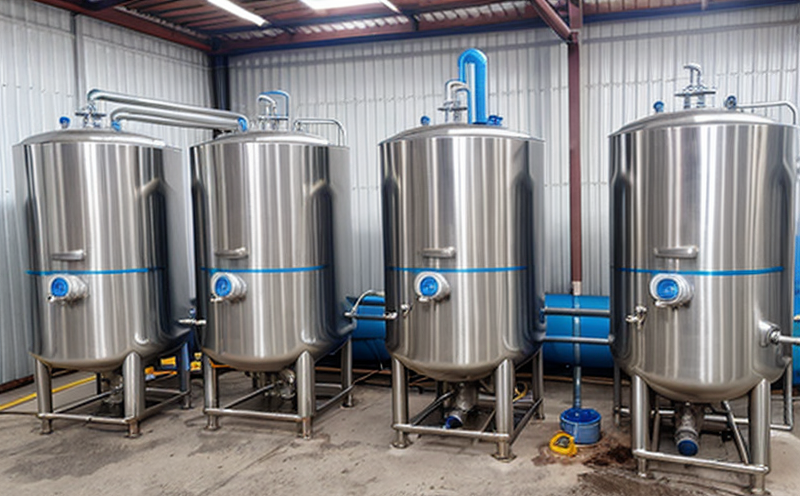ASTM D3869 Iodide Test in Cooling Water
The ASTM D3869 standard test method provides a precise and reliable procedure for determining iodide ion content in cooling water systems. This is particularly important because even trace levels of iodide can have significant effects on the performance and longevity of industrial equipment such as condensers, heat exchangers, and boilers.
The presence of iodides can lead to galvanic corrosion when mixed with chloride ions commonly found in seawater or brackish water. This is especially relevant for facilities located near coasts or using desalinated water supplies where the cooling water may contain elevated levels of chloride ions. By accurately measuring and controlling the concentration of iodide, plant operators can mitigate risks associated with this corrosive effect.
The test involves a titration procedure using potassium persulfate as an oxidizing agent to convert iodide ions into elemental iodine. The liberated iodine is then titrated against sodium thiosulfate solution in the presence of starch indicator. The endpoint is determined by the color change from blue to clear, indicating complete reaction.
Proper sample preparation is critical for accurate results. Samples should be collected from representative locations within the cooling water system and analyzed as soon as possible after collection. If immediate analysis cannot be performed, samples must be stored under specific conditions to prevent changes in iodide ion concentration due to microbial activity or chemical reactions.
The ASTM D3869 method is widely recognized for its accuracy and reliability across various industrial sectors including power generation, petrochemicals, oil refineries, and manufacturing plants. Compliance with this standard ensures that facilities meet regulatory requirements set forth by bodies such as the Environmental Protection Agency (EPA) and Occupational Safety & Health Administration (OSHA).
The ability to accurately measure iodide content in cooling water systems enables better management of these critical processes, leading to reduced maintenance costs, extended equipment lifespan, improved energy efficiency, and lower environmental impact.
Given the complexity involved in measuring trace quantities of iodide ions, it is essential that laboratories specializing in this service possess the necessary expertise, certified personnel, advanced instrumentation, and adherence to strict quality control measures. Our laboratory adheres strictly to ASTM D3869 guidelines ensuring consistent, reliable results every time.
- Compliance with international standards ensures high-quality results.
- Experienced professionals who understand the nuances of this test ensure accurate interpretation.
- Advanced analytical equipment guarantees precision and accuracy in measurements.
In summary, implementing ASTM D3869 testing for iodide content in cooling water systems not only enhances operational efficiency but also promotes sustainability by reducing waste generation and improving resource utilization. This service is indispensable for maintaining optimal conditions within industrial cooling systems ensuring compliance with regulatory standards while minimizing the risk of costly downtime due to equipment failure.
Benefits
The implementation of ASTM D3869 iodide testing in cooling water offers numerous advantages that contribute significantly towards enhancing operational efficiency, reliability, and sustainability. Here are some key benefits:
- Enhanced Equipment Durability: By monitoring and managing iodide levels, the risk of galvanic corrosion is minimized, thereby extending the lifespan of critical equipment.
- Economic Savings: Reduced maintenance costs due to longer service intervals for cooling towers and other components. Additionally, lower energy consumption results in cost savings.
- Sustainable Operations: Proper management of iodide content helps in maintaining optimal water quality, reducing waste generation, and improving resource utilization.
- Regulatory Compliance: Ensures adherence to local, national, and international regulations concerning industrial wastewater discharge limits.
The precision provided by ASTM D3869 testing allows for proactive management of cooling water systems, leading to more efficient operations and reduced environmental impact.
Industry Applications
The ASTM D3869 iodide test is applicable across a wide range of industries where cooling water systems play an integral role. These include:
- Power Generation: For nuclear power plants and coal-fired thermal plants, ensuring proper control over iodide levels in the condenser cooling water.
- Petrochemicals & Oil Refineries: Where desalinated seawater is used for process cooling, monitoring iodide content helps prevent corrosion issues.
- Fabrication Plants: For metalworking industries that rely on cooling towers to dissipate heat generated during manufacturing processes.
- Pharmaceutical Manufacturing: Ensuring compliance with stringent quality standards in the production environment where even trace amounts of contaminants can have severe implications.
In each application, accurate measurement and control of iodide ions are crucial for maintaining efficient operations while ensuring product purity and safety.





